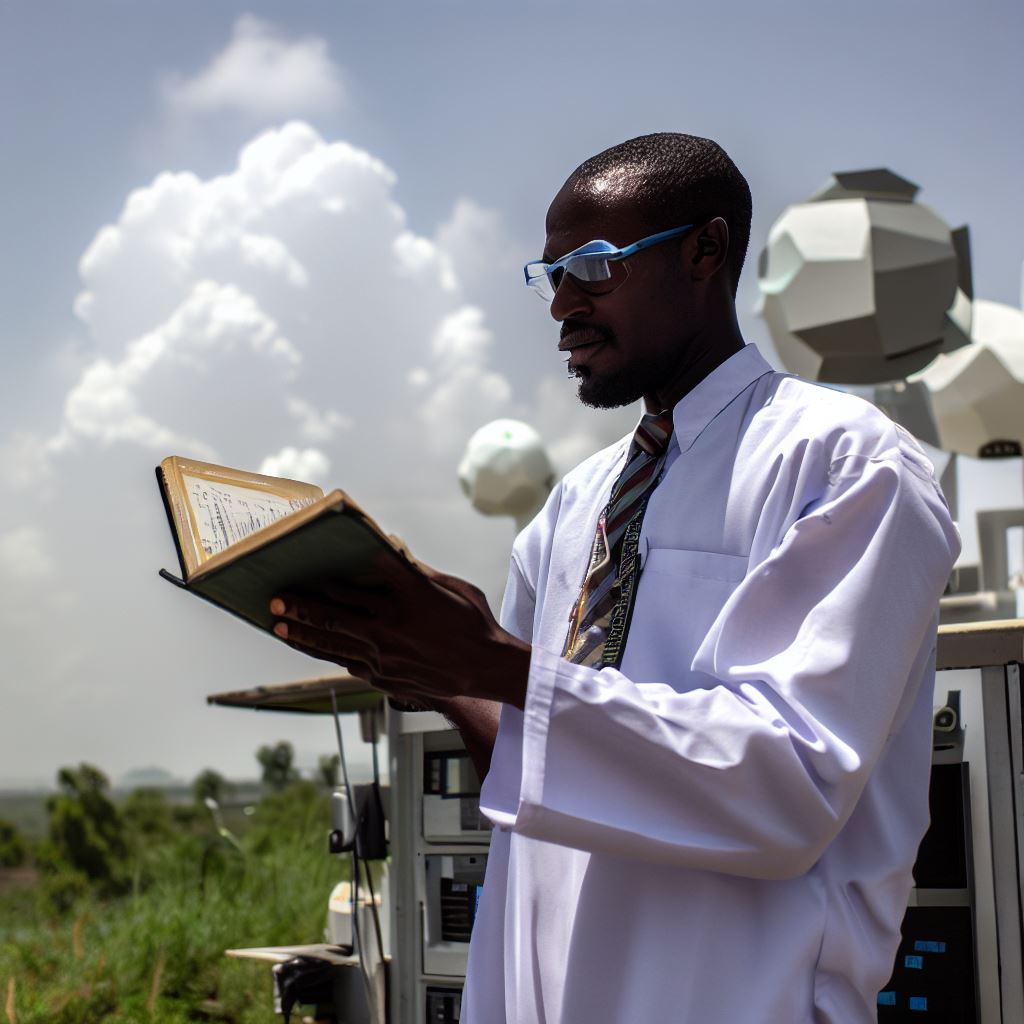Introduction
Space science is an essential field of study that holds significant importance in advancing our understanding of the universe.
It encompasses various disciplines such as astronomy, astrophysics, planetary science, and cosmology.
In recent years, Nigeria has witnessed an increasing interest in space science studies.
The enthusiasm grows due to technological advances, curiosity about the unknown, and economic and technological potential.
One of the main reasons why space science studies are crucial is their contribution to the development of new technologies.
Research in this field has led to the creation of satellite technology, which has revolutionized communication, weather forecasting, and navigation systems.
Moreover, space science studies also provide insights into the origins of the universe, the behavior of celestial objects, and the possibilities of extraterrestrial life.
These findings not only expand our knowledge but also inspire new questions and further exploration.
Nigeria, like many other countries, recognizes the significance of space science studies and has taken steps to promote and support research in this field.
The National Space Research and Development Agency (NASRDA) was established in 2001 to coordinate and oversee space-related activities in the country.
Furthermore, the Nigerian government has initiated scholarship programs specifically aimed at encouraging students to pursue space science studies.
These scholarships provide financial support and opportunities for talented individuals to receive quality education and training in the field.
In fact, space science studies hold immense importance in expanding our understanding of the universe and fostering technological advancements.
The increasing interest in space science studies in Nigeria reflects the country’s recognition of its potential benefits and commitment to nurturing talent in this field.
The availability of scholarships further encourages students to pursue their passion and contribute to the ongoing exploration of space.
Overview of Space Science Studies in Nigeria
In this section, we will provide an overview of space science studies in Nigeria.
We will discuss the current state of space science education in the country and the available programs and institutions offering these studies.
The current state of space science education in Nigeria
- Nigeria is making significant progress in space science education.
- The country has recognized the importance of space exploration and research.
- Nigeria has established various institutions and programs to promote space science studies.
- There is a growing interest among students in pursuing space science education.
- The Nigerian government has shown support for space science education through funding and investments.
Available programs and institutions offering space science studies
- The National Space Research and Development Agency (NASRDA) is at the forefront of space science studies in Nigeria.
- NASRDA offers various programs in space science, including undergraduate and postgraduate degrees.
- Several universities in Nigeria have also introduced space science courses in their curriculum.
- Some of the universities offering space science studies include the University of Nigeria, Obafemi Awolowo University, and the University of Lagos.
- These institutions provide students with the opportunity to specialize in various aspects of space science, such as astrophysics, satellite technology, and remote sensing.
- There are also scholarships and grants available specifically for students pursuing space science studies.
- The Nigerian government and other organizations support these scholarships to encourage more students to pursue space science education.
- Scholarships cover tuition, research, and sometimes travel expenses. Recipients contribute to space science in Nigeria.
- Research centers and institutions collaborate, fostering space science growth.
In essence, Nigeria is making great strides in space science education.
The country recognizes the importance of space exploration and has established institutions and programs to promote this field of study.
With scholarships and support from the government, more students are being encouraged to pursue space science studies.
The universities and research centers in Nigeria provide a conducive environment for students to specialize in various aspects of space science.
It is an exciting time for space science education in Nigeria, with promising developments on the horizon.
Read: Education for Space Scientists in Nigeria: A Pathway
Importance of Scholarships for Space Science Studies in Nigeria
High cost of education in space science studies
- Space science studies require extensive resources and advanced technology.
- The cost of equipment, research materials, and infrastructure in the field is significant.
- Advanced laboratories, telescopes, and other facilities are necessary for practical learning.
- The expenses associated with field trips and internships add to the overall cost.
- Without scholarships, many aspiring students may not be able to afford an education.
- The high cost of space science studies acts as a barrier for talented students.
- Scholarships level the educational playing field, making it accessible to all, regardless of economic background.
The need for scholarships to promote accessibility and inclusivity
- Space science studies should be accessible to all, regardless of financial status.
- Scholarships promote inclusivity and diversity, allowing disadvantaged students to pursue space science.
- They ensure deserving students aren’t hindered by financial constraints, fostering a level playing field.
- Scholarships empower talent, encouraging contributions and collaboration among diverse students.
- Supporting economically disadvantaged students enhances social equality.
- Scholarships in space science pave the way for a brighter and more inclusive future.
Opportunities scholarships provide for talented students
- Scholarships provide financial support for tuition fees, textbooks, and other educational expenses.
- This enables students to focus more on their studies without worrying about the financial burden.
- Talented students can engage in research projects and contribute to advancements in space science.
- Scholarships often offer mentorship opportunities with leading experts in the field.
- These mentors can guide and inspire students, nurturing their passion for space science.
- Students can participate in internships and gain practical experience in renowned space organizations.
- Scholarships may also include opportunities for students to attend conferences and workshops.
- Such events enable students to network with professionals and expand their knowledge.
- Scholarships recognize academic excellence and encourage students to strive for higher achievements.
- They serve as a stepping stone for students to pursue advanced degrees and research careers.
Overall, scholarships for space science studies in Nigeria play a vital role in making education accessible, promoting inclusivity, and nurturing talented individuals.
The high cost of education in this field can be a barrier for many students, but scholarships help alleviate this burden.
By providing financial support, scholarships ensure that students from all backgrounds can pursue their passion for space science.
Furthermore, scholarships offer numerous opportunities for talented students, ranging from financial aid to mentorship and practical experience.
Through scholarships, Nigeria can cultivate a diverse community of scholars and contribute to advancements in the field of space science.
Read: Space Technology in Nigeria: A Scientists’ Overview
Types of Scholarships Available in Nigeria for Space Science Studies
Government-sponsored scholarships
These scholarships are funded by the Nigerian government to support students pursuing space science studies.
They are usually awarded based on academic merit and financial need.
Government-sponsored scholarships often require applicants to meet certain citizenship and residency requirements.
They may also have specific academic criteria, such as minimum GPA or standardized test scores.
Scholarships provided by private organizations and foundations
Various private organizations and foundations in Nigeria offer scholarships for space science studies.
These scholarships can be merit-based, need-based, or a combination of both.
Private organizations and foundations may set unique scholarship criteria, including financial need, community engagement, and space science career goals.
Scholarships offered by universities and research institutions
- Many universities and research institutions in Nigeria provide scholarships specifically for students interested in space science studies.
- Universities and research institutions may have scholarships available for both undergraduate and graduate students.
- These scholarships may be specific to certain fields within space science, such as astrophysics or aerospace engineering.
- Additionally, some institutions may require scholarship recipients to participate in research or contribute to the advancement of the field.
- These scholarships are usually awarded based on academic excellence, research potential, or a combination of academic and extracurricular achievements.
Each of these types of scholarships has its own unique set of eligibility criteria and application procedures.
It is important for prospective students to thoroughly research and understand these requirements before applying.
It is important for students to be proactive in searching for scholarships and to apply to as many as they are eligible for.
This can increase their chances of receiving financial support for their space science studies.
Applicants must heed scholarship deadlines and submit all required documents promptly. Missing deadlines or omitting information can lead to disqualification.
In short, Nigeria offers various space science scholarships from government, private groups, universities, and research institutions.
Prospective students should research eligibility and application steps to maximize their chances of support.

Eligibility Criteria for Space Science Scholarships in Nigeria
Achieving a scholarship in space science studies in Nigeria is a dream for many students.
However, to be eligible for such scholarships, candidates must meet certain criteria set by the scholarship providers.
In this section, we will discuss the various eligibility requirements that aspiring scholars need to fulfill.
These criteria include academic requirements, financial needs assessment, achievement in related fields, and other specific criteria as determined by the scholarship providers.
Academic requirements
- The first eligibility criterion for space science scholarships in Nigeria is meeting academic requirements.
- Applicants must have a strong academic background and maintain a high GPA throughout their academic career.
- They should possess a bachelor’s degree or equivalent in a relevant field of study.
- Candidates may be required to provide academic transcripts, letters of recommendation, and personal statements.
- Furthermore, they must demonstrate a strong passion for space science and a desire to contribute to the field.
Financial needs assessment
Aside from academic qualifications, scholarship providers may consider the financial needs of applicants.
- Candidates might be required to provide detailed information about their financial status and income sources.
- The aim is to ensure that the scholarships are awarded to those who lack the financial means to pursue their studies.
- Applicants from lower-income backgrounds are usually given preference in the selection process.
- Additionally, students must show that they are committed to applying the scholarship funds solely for educational purposes.
Achievement in related fields
Another important eligibility criterion is the achievement of applicants in related fields.
- Students who have excelled in subjects like physics, mathematics, or engineering may have an advantage.
- Prior experience in space science research or projects can significantly strengthen their applications.
- Scholarship providers value candidates who have already demonstrated their dedication to the field.
- Extracurricular activities and participation in relevant competitions or conferences may also be considered.
Other specific criteria set by scholarship providers
- Scholarship providers may establish specific criteria that applicants must meet.
- This could include proficiency in certain languages, specific research interests, or other specialized skills.
- It is important for candidates to thoroughly read and understand the scholarship guidelines and requirements.
- Failing to meet any of the specific criteria may result in disqualification from the selection process.
- Applicants must ensure that they fulfill the additional criteria set by scholarship providers.
Meeting the eligibility criteria is crucial for students aspiring to receive space science scholarships in Nigeria.
Meeting academic, financial, achievement, and other criteria enhances the chances of securing prestigious scholarships.
Read: Nigeria’s Space Missions: The Scientists Behind Them
How to Apply for Space Science Scholarships in Nigeria
Research and identify available scholarships
Look for organizations, institutions, or government agencies that offer scholarships for space science studies in Nigeria.
Check their websites, and social media platforms, or contact them directly for information.
Gather all necessary documents and requirements
Make a list of the documents needed for each scholarship application.
Prepare your academic transcripts, recommendation letters, personal statements, and any other required materials.
Follow the application process provided by each scholarship provider
Read the guidelines and instructions carefully for each scholarship you are interested in.
Take note of deadlines, submission methods, and any specific requirements.
Fill out the application forms accurately and truthfully.
Seek guidance from mentors, teachers, or professionals for recommendations
- Approach individuals who can provide strong recommendations based on your academic achievements and passion for space science.
- Ask for recommendation letters well in advance, giving your mentors enough time to write them.
- Provide them with relevant information about yourself and your goals in space science.
By following these steps, you will increase your chances of securing a space science scholarship in Nigeria.
Remember to start early, stay organized, and submit your applications on time. Good luck!
Tips for a Successful Application
Understanding the scholarship requirements and guidelines
- Read and comprehend the eligibility criteria thoroughly before applying.
- Pay attention to any specific academic achievements or prerequisites mentioned in the requirements.
- Ensure your chosen space science program aligns with the scholarship’s focus.
- Identify any additional documentation or supporting materials needed for the application.
Writing an exceptional personal statement or essay
- Highlight your passion and genuine interest in space science studies.
- Clearly articulate your academic and career goals related to the field.
- Showcase your knowledge of current developments and contributions to space science.
- Provide specific examples of how you have demonstrated leadership, innovation, or problem-solving skills.
- Engage the reader with a well-structured and persuasive narrative.
Gathering strong recommendation letters
- Select individuals who can speak to your academic abilities, research experiences, or relevant skills.
- Reach out to professors, mentors, or professionals who can provide a comprehensive evaluation of your potential.
- Supply them with all the necessary information about the scholarship requirements and your achievements.
- Give your recommenders ample time to write thoughtful and personalized letters.
- Express your gratitude for their support and provide them with a copy of your personal statement to align their letters with your goals.
Submitting the application before the deadline
- Begin the application process early to ensure sufficient time for researching, writing, and gathering materials.
- Create a timeline to track each step of the application process, including request deadlines for recommendation letters.
- Double-check the submission requirements, ensuring all sections and supporting documents are complete.
- Proofread your personal statement and essays for grammar, spelling, and content errors.
- Submit the application well before the deadline to avoid any last-minute technical issues or delays.
- Confirm receipt of your application to ensure its successful submission.
Remember, securing a scholarship for space science studies is highly competitive.
Following these tips can increase your chances of a successful application. Good luck!
Scholarship Opportunities for Space Science Studies in Nigeria
Specific Scholarships Available
- Tertiary Education Trust Fund (TETFUND) Scholarships: Established to support Nigerian students pursuing space science studies.
- National Space Research and Development Agency (NASRDA) Scholarships: Offered to exceptional students interested in space science programs.
- Nigeria Communication Satellite (NIGCOMSAT) Scholarships: Provides funding for Nigerian students studying space science and related fields.
- Centre for Satellite Technology Development (CSTD) Scholarships: Available for Nigerian students pursuing space science studies.
- Nigerian Universities Commission (NUC) Scholarships: Offered to outstanding students enrolled in space science courses at Nigerian universities.
Benefits and Advantages of Each Scholarship
Tertiary Education Trust Fund (TETFUND) Scholarships
- Full tuition coverage for undergraduate and postgraduate space science studies.
- Monthly stipends to support living expenses during the course of the program.
- Availability of research grants for scholars to conduct space science research projects.
National Space Research and Development Agency (NASRDA) Scholarships
- Funding for tuition fees, research expenses, and accommodation.
- Opportunity to collaborate with leading space scientists and researchers.
- Possibility of employment within NASRDA upon successful completion of the program.
Nigeria Communication Satellite (NIGCOMSAT) Scholarships
- Full financial support for tuition fees and necessary study materials.
- Internship opportunities at NIGCOMSAT to gain practical experience in the field.
- Potential employment prospects with NIGCOMSAT and other related organizations.
Centre for Satellite Technology Development (CSTD) Scholarships
- Funding for tuition fees, accommodation, and research projects.
- Access to state-of-the-art facilities, laboratories, and research tools.
- Mentorship programs by experienced professionals in the space science industry.
Nigerian Universities Commission (NUC) Scholarships
- Full or partial coverage of tuition fees for space science courses.
- Networking opportunities with fellow scholars and experts in the field.
- Potential involvement in cutting-edge space science research conducted by Nigerian universities.
Success Stories of Previous Scholarship Recipients
Several individuals who received scholarships for space science studies in Nigeria have achieved remarkable success:
- Oluwafemi Adeoye, a TETFUND scholar, is now a renowned astrophysicist contributing to space research globally.
- Chioma Okonkwo, a NASRDA scholar, played a significant role in designing Nigeria’s first indigenous satellite.
- Yusuf Ibrahim, a NIGCOMSAT scholar, secured a prestigious job at an international space agency after completing his studies.
- Grace Adebayo, a CSTD scholar, received recognition for her innovative research on satellite communication systems.
- Emeka Nwosu, an NUC scholar, is now a respected professor at a Nigerian university, inspiring future space scientists.
These success stories exemplify the opportunities and impact that scholarships for space science studies offer in Nigeria.
They showcase the transformative power of education and how it can shape a bright future not only for the recipients but for the advancement of space science in the country.
As Nigeria continues to prioritize space science and exploration, these scholarships play a crucial role in nurturing talented individuals and building a pool of expertise.
By investing in the education of aspiring space scientists, Nigeria is fostering innovation, technological advancements, and national pride.
For Nigerians passionate about space science, these scholarships pave the way to dream realization, impactful research, and advancing Nigeria’s space program.
Read: Nigeria’s Space Programs: A Scientist’s Perspective
Conclusion
Scholarships play a crucial role in promoting space science studies, opening doors for aspiring students.
These financial awards are not mere tokens, they are the fuel that propels aspiring space scientists into the stratosphere of their dreams.
Scholarships are not just beneficial; they are essential in nurturing the next generation of space explorers.
To all the interested students, don’t hesitate to pursue your dreams in space science and apply for scholarships.
In closing, scholarships create opportunities, provide financial support, and encourage excellence in the field of space science.
They act as the warp drive, propelling students toward the universe’s frontiers, and shaping our cosmic future.




